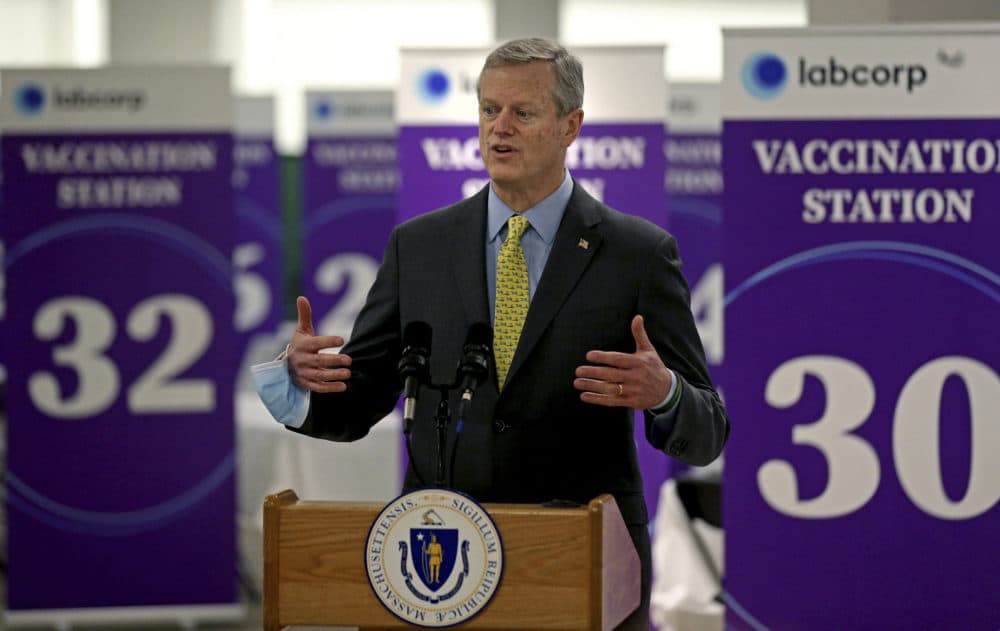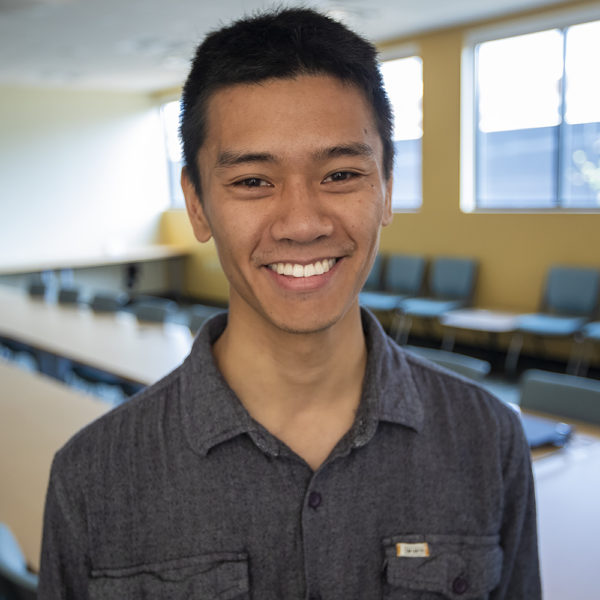Advertisement
Coronavirus Coverage
Emotions Ran High During A State Hearing On Mass.' Vaccine Rollout. Here Are 3 Takeaways

Members of the state Legislature held a public hearing to discuss failures and delays in Massachusetts' vaccine rollout. For six hours, a joint committee of state representatives and senators grilled Gov. Charlie Baker and members of his administration, listening to them testify on issues related to vaccine distribution and equity.
The technical problems people experienced trying to sign up for vaccine appointments loomed large at the hearing. Last week, state websites crashed under the weight of a million more vaccine seekers hustling to get one of a mere 60,000 slots. This week, people posted screenshots showing wait times in the tens or hundreds of thousands of minutes to social media.
Here are some takeaways from the hearing.
1. Technology failures exacerbate inequities in the pandemic.
Gladys Vega, director of the Chelsea-based nonprofit La Colaborativa, gave her testimony in the middle of the hearing. She’s been working toward getting vaccinations in communities of color on par with those in white communities. Her testimony pointed out that a faulty system exacerbates already existing equity problems.
“I am tired of people not having access to the vaccination,” she said, her voice breaking. “I do my best to convince people in my community that getting vaccinated is the right thing to do. But it’s very hard, because I convince them in a system that doesn’t work — in a system that crashes.”
During her testimony, she carried her camera outside a La Colaborativa location that stores food and essentials to show a line of hundreds of people waiting for supplies. Pleading to the legislators on the committee, Vega told them her community needed vaccinations desperately.
The problem Vega described illustrated a point that MIT logistics expert Ben Linville-Engler has made. When people experience failures in logistics, it erodes their trust in the system and they start losing motivation to keep trying. This is especially tough in communities hit hard by the virus and which may not have the privilege of being able to wait by computers for hours to deal with glitchy systems.
Advertisement
2. There was a gaping disconnect between state officials and the creators of the state’s software for managing vaccinations, PrepMod.
One key moment was when the committee asked Tiffany Tate, executive director of the Maryland Partnership for Prevention and creator of the PrepMod software, if she knew when Massachusetts would open eligibility to people 65 and older and those with certain medical conditions. She replied that she had an idea it was happening, but not when exactly.
“Did PrepMod receive notice from Massachusetts to expect a surge in advance of the cohort opening up for vaccine appointments?” state Sen. Jo Comerford asked.
“We meet with the state daily, and we had been asked to make preparations to the site in terms of language that would have people attest and make sure they were eligible to the vaccine. So, we had knowledge this was coming. I personally did not know that it was happening on that particular day,” Tate replied.
Tate did not say the state asked her nonprofit to improve the site’s capacity to deal with high traffic, only that she was asked to make changes regarding eligibility. It is also odd that she was unaware when the appointments would open to the newly eligible population, as this is an important piece of information for web managers to have when preparing for expected surges in traffic.
Another odd exchange happened when the committee asked Tate if she could provide a program to allow people to pre-register for vaccine appointments. This would save people’s time and smooth the registration process when people become eligible.
“We have a software product available since early fall called CovidReady,” Tate responded. “[The Department of Public Health] secured a license to CovidReady, which is the preregistration software.”
But later in the day, Secretary of Health and Human Services Marylou Sudders said that was, in fact, not true.
“We have not purchased CovidReady from PrepMod,” Sudders said. “Our staff, when they did the demo of it, did not feel that it was [a pre-registration system]. It was a data aggregator as opposed to a pre-registration system, sir.”
It’s not clear if Tate misspoke regarding CovidReady or if Sudders’ staff simply did not see how CovidReady could be used as a pre-registration system. Either way, these exchanges raised more questions than answers.
3. State legislators spoke to the feeling of chaos in the vaccine rollout.
The disconnect between the state and the PrepMod system seems to be part of a larger trend of people feeling that the rollout is confusing. Clinicians running vaccine sites have expressed frustration at how the rollout policies seem to keep shifting and changing. During the hearing, state Sen. Cindy Friedman spoke to this feeling.
“[The] twists and turns, the change in plans, the communication that changes depending on who you are talking to. Even I, with all my knowledge, am completely at a loss as to what is going on at times,” she said.
The unpredictable nature of the rollout has people on edge. State Sen. Eric Lesser conveyed some of that frustration to the governor during the hearing.
“Will you say you’re sorry to the millions of people [who could not make an appointment],” Lesser demanded.
“Of course. Absolutely. Definitely. Yes,” Baker responded. A hint of exhaustion crept into his voice.
He may have to do this rodeo again. The committee chair invited Baker for another hearing in a couple weeks’ time.
“Well, this one’s been so much fun, I’ll certainly look forward to coming back,” Baker said.
